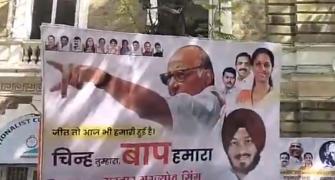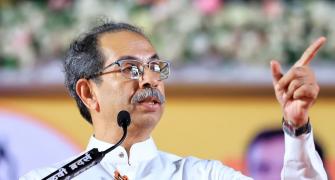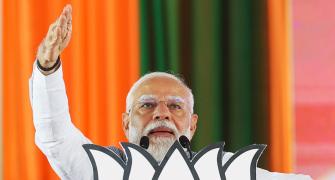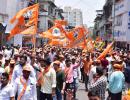As the Shiv Sena-Uddhav Balasaheb Thackeray and Nationalist Congress Party-Sharad Pawar prepare to lock horns with their rival factions in key seats of Baramati, Maval and Mumbai South Central in Maharashtra, their new symbols are only going to add to the electoral drama.

Following the split in the Shiv Sena and the NCP over the last two years, the Election Commission (EC) handed the “mashal” (flaming torch) to Uddhav Thackeray's party and “man blowing a turha” (a traditional trumpet) to the Sharad Pawar-led NCP, mounting a challenge to both the new factions this election season.
Even as the two parties appeared confident that they have reached out to every voter and publicised their new symbols, experts suggested varying impact of the split and the symbols on the vote bank.
"Symbols play an important role in elections, and a change takes time to trickle down, particularly if the party has experienced a vertical split. It will be a polarised election in Baramati, and it is a disadvantage for the party with the new poll symbol,” political commentator and journalist Rashid Kidwai said.
All eyes will be on the Pawar stronghold Baramati, which will see three-term MP Supriya Sule of the NCP-SP take on her sister-in-law and Deputy Chief Minister Ajit Pawar's wife Sunetra Pawar, who will be contesting on the party's original symbol - the analogue clock.
Baramati will go to polls on May 7 in the third phase of the Lok Sabha elections.
The NCP-SP, which will contest with the “man blowing a turha”, recently lodged a complaint with the EC after it allotted a trumpet-like symbol to independent candidate Shaikh Soyalshah Yunusshah and has identified it as “tutari”.
The “turha” in the NCP-SP symbol is also called “tutari” in Marathi.
“They are trying to trick the voters. The EC is working at the behest of the BJP. While we have complained to the poll authorities about the trumpet symbol, we are not relying on them to take any action. We are taking our own measures to ensure that the symbol reaches the voters,” Clyde Crasto, national spokesperson of the NCP (SP), said.
In the era of social media, it hasn't been difficult to take the party symbol to every voter in the state, he added.
“There is intrigue among people about the symbol, and voters have done their research.”
The Shiv Sena witnessed a split after a group led by Chief Minister Eknath Shinde staged a rebellion in June 2022. Ajit Pawar and his supporters joined the Shinde government in July 2023 after breaking away from the Sharad Pawar-founded NCP.
While the NCP-SP is testing the poll waters with its new symbol, this won't be the first for the Balasaheb Thackeray-founded Shiv Sena, which contested on different symbols till 1989 when the EC awarded it the bow and arrow.
“In the past, the undivided Shiv Sena contested on poll symbols like a cup and saucer, railway engine, and flaming torch, before they were allocated the bow and arrow,” veteran journalist P Sukrut Khandekar said.
He added that the impact of symbol change will be minimal as each party has a loyal vote bank in every constituency.
As soon as the EC handed the mashal symbol to the Shiv Sena-UBT, the party mobilised its cadres to take the symbol to every voter and even released a “Mashal Geet” to popularise it.
The rival Sena factions will have a head-on clash in the Maval Lok Sabha constituency, which will vote on May 13 in the fourth phase of the elections, where the Shiv Sena-UBT has fielded Sanjog Waghere against two-term MP Shrirang Barne of the Eknath Shinde faction.
The Shiv Sena UBT's Anil Desai will battle it out with former colleague and sitting MP Rahul Shewale in Mumbai South Central, where polls will be held in the fifth phase on May 20.
“In rural areas, voting on a new symbol is not new, as people are used to them during elections to local bodies and corporations,” MLC Ambadas Danve, the leader of the Opposition in the state legislative council, said.
In this election, more than the candidates, the party has focused on publicising the symbol, he added.
“In Maval, we are urging voters not to vote for the bow and arrow, a symbol chosen by party founder Balasaheb Thackeray, but which was stolen from us,” Danve said.
According to Danve, the traditional Shiv Sena vote bank is still with Uddhav Thackeray.
“New voters can sway to the other party,” he said.
The EC recently served a notice to the Shiv Sena (UBT) asking it to remove the words “Hindu” and "Jai Bhavani" from the "Mashal Geet", which the party chief Uddhav Thackeray said he won't abide by.
“We are grateful to the EC. The ‘Mashal Geet' became more popular because the poll body took objection to it,” Danve said.
Political analyst Abhay Deshpande said that the victim card is playing out well for Uddhav Thackeray and Sharad Pawar, and the anti-incumbency is helping them.
“In rural areas, people have not liked the splits in these two parties and the manner in which they were engineered,” Deshpande said.
He added that there is an agrarian crisis and Dalits are concerned about a possible change in the Constitution.
“...and the BJP is targeting Muslims with the Prime Minister's recent remarks about redistribution of wealth. Rural Maharashtra has the Dalit-Muslim-Kunbi combination, and the MVA is banking on this,” he said.








